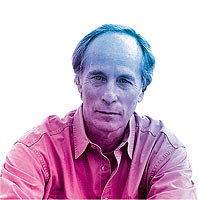
The Lay of the Land, the final volume in Richard Ford’s New Jersey trilogy, begins much like The Sportswriter and Independence Day, with Frank Bascombe, Ford’s navel-gazing anti-hero, contemplating a life that’s essentially over. He’s settling into what he calls the “Permanent Period,” characterized by contentment but also the worry that he’s become “just an organism that can still make noise, but not much more than that.”
Bascombe is an accidental Buddhist, a suburban philosopher. Currently wifeless, Bascombe has a chipper subcontinental sidekick, a Tibetan whose various Himalayan koans are counterpoint to Bascombe’s homegrown ones.
The incidents in these books—ex-wives coming and going, long-lost husbands returning, children trying to find their own paths—trigger Bascombe to revise his notions of life, death, marriage, and the ideal of the good life. Ford does a masterful job of juggling these enormous questions—more than the characters, they’re the central subjects of the novel.
Ford has a substantial cadre of detractors who see his work as a monument to the suffering of the middle-aged, middle-class white suburban male, as if the world needed another one. But it’s a feat to make art out of this well-explored wasteland. Frank Bascombe is, in obvious ways, the love child of Walker Percy’s Binx Bolling and Updike’s Rabbit Angstrom, but Ford’s books do more than follow in their footsteps.
A reader isn’t driven through Ford’s Bascombe books by a desire to know what happens next. They work more like a narcotic, producing an altered state, a heightened awareness mirroring Bascombe’s inner world. Reading Ford, you can feel uplifted and empowered in a way that might make you wonder if his books are really novels at all, and not some sublime species of self-help.
—The Lay of the Land , By Richard Ford, Knopf; October 24 ($26.95). Next: Op-Ed Columnist Rich Frank Connects the Dots